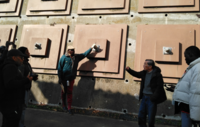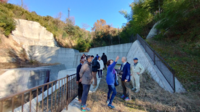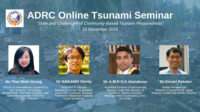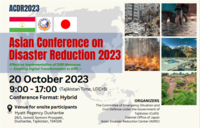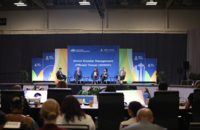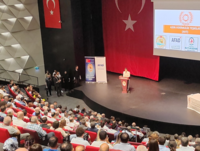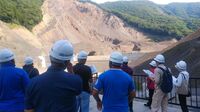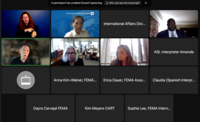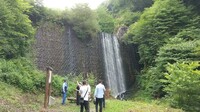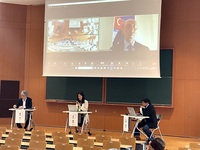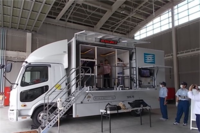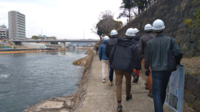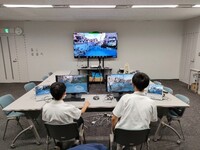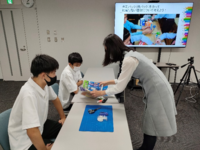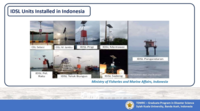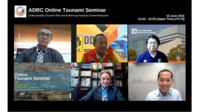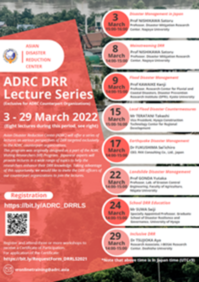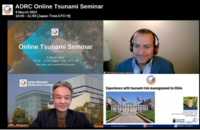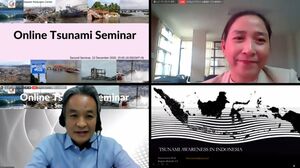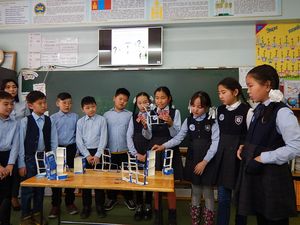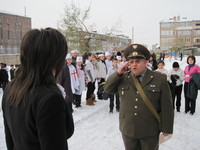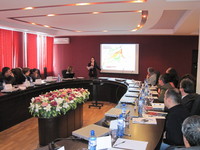Activity Report: Themes & Issues >> Education & Public Awareness for DRR
19 December 2023 - 21 February 2024
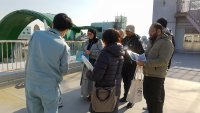 Asian Disaster Reduction Center (ADRC) conducted a JICA Knowledge Co-Creation Program "Comprehensive Disaster Risk Reduction" from 19 December 2023 to 21 February 2024, with the cooperation of JICA Kansai. Six government officials from six countries: Algeria, Bangladesh, Brazil, Indonesia, Pakistan, Sri Lanka, participated in this course, learning how to formulate and implement local disaster risk reduction (DRR) plans to promote DRR measures in each country.
Asian Disaster Reduction Center (ADRC) conducted a JICA Knowledge Co-Creation Program "Comprehensive Disaster Risk Reduction" from 19 December 2023 to 21 February 2024, with the cooperation of JICA Kansai. Six government officials from six countries: Algeria, Bangladesh, Brazil, Indonesia, Pakistan, Sri Lanka, participated in this course, learning how to formulate and implement local disaster risk reduction (DRR) plans to promote DRR measures in each country.
It was conducted in a hybrid format, where participants attended online programs before coming to Japan for the in-person program. In the six-week program in Japan, the participants attended site visits and lectures in disaster-related organizations/facilities in Hyogo, Osaka, Kyoto, Kumamoto, and Hiroshima prefectures to learn about Japanese experiences and countermeasures of DRR. Furthermore, they exchanged information and opinions on each country's budget situation and inter-organizational cooperation to promote DRR. At the end of the course, they presented a draft local DRR plan, which they formulated through the programs.
(2024/02/28 15:00)
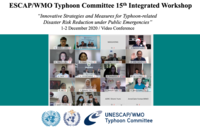
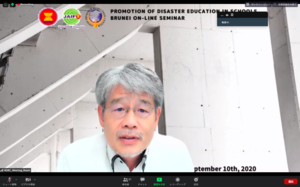
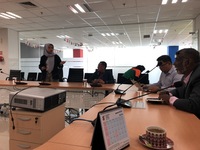
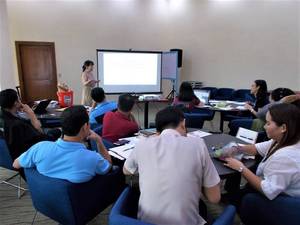 14 March 2019 (Philippines, Makati)
14 March 2019 (Philippines, Makati) 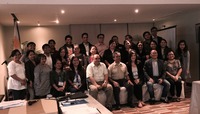
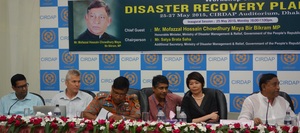
The event gathered over 50 high level and technical delegations from various ministries of the government, universities, development partner organizations, NGOs, and private sector to achieve to discuss recovery agenda in the context of the Sendai Framework for Disaster Risk Reduction. The event was inaugurated by Mr. Mofazzal Hossain Chowdhury Maya Bir Bikram, Minister for Disaster Management and Relief (MoDMR) of the People's Republic of Bangladesh, who expressed commitment to pursue effective disaster management programs by incorporating 'build back better'. At the closing, Mr. Hasanul Haq Inu, Minister for Information, assured the participants that build back better efforts in recovery, rehabilitation, and reconstruction will be advocated in Bangladesh through the support of the ministry and media organizations.
One of the workshop outcomes was the identification of recovery issues, where the participants came up with initial strategies and actions to be integrated in the Pre-Disaster Recovery Plan of Bangladesh. On the bases of the workshop outcomes, the following next steps were identified. Firstly, a parliamentary meeting on 'build back better' will be organized on June 16, 2015 at the Bangladesh Parliament to discuss disaster risk reduction and recovery issues that require legal support and legislation. Secondly, the MoDMR through the support of UNDP Bangladesh will take forward the initial strategies and actions for Pre-Disaster Recovery Plan by organizing a writeshop on the first week of August 2015. Thirdly, through coordination between MoDMR and BBBF, the list of recovery agendas shall be advocated in existing policy and planning instruments in Bangladesh, including the Delta Plan that is facilitated by the Ministry of Planning. Fourthly, under the auspices of MoDMR, the BBBF shall take further steps to advocate in linking up key stakeholders in Bangladesh so that the Inter-Ministerial Disaster Coordinating Council (IMDCC) is convened and recovery agenda is integrated in the plans. Finally, new programs and projects to promote build back better shall be proposed by BBBF in collaboration with MoDMR and other relevant stakeholders. The initial proposals include building critical mass of local recovery experts and volunteers and partnership between local universities and international knowledge hubs to promote recovery agenda in school curricula as well as facilitate knowledge-sharing and exchange.
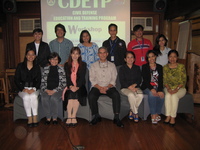 Asian Disaster Reduction Center (ADRC) had participated in the JICA Disaster Risk Reduction and Management (DRRM) Capacity Enhancement Project in the Philippines from March 2012 to February 2015 (3 years) as a member of the Project team.
Asian Disaster Reduction Center (ADRC) had participated in the JICA Disaster Risk Reduction and Management (DRRM) Capacity Enhancement Project in the Philippines from March 2012 to February 2015 (3 years) as a member of the Project team. The "Philippine Disaster Risk Reduction and Management Act of 2010 (RA No. 10121)" was enacted in May 2010, creating the legal framework to implement a new approach to disaster management called Disaster Risk Reduction and Management (DRRM). Under the DRRM Act, a new highest decision-making body related to disaster management on the national level was established as the National Disaster Risk Reduction and Management Council (NDRRMC). The Office of Civil Defense (OCD) was appointed as the secretariat of the NDRRMC and expected to play a leading role for the DRRM activities in the Philippines. The Project was formulated with a goal of strengthening capacity on DRRM of the OCD.
The Project team proviced technical assistance to the activities of the OCD on DRRM planning, standardization of the DRRM information management, strengthening of the DRRM education and training system, and enhancement of the support system to Community Based Disaster Risk Reduction and Management (CBDRRM).
The ADRC contributed to strengthening DRRM education and training system of the Philippines including of the establishment of the "National DRRM Education and Training Plan" with the DRRM training modules for national and local government officers, and private sectors as priority training programs, and the "Civil Defense Education and Training Program" for the OCD staff members.
For more details, the final report of the project is available at:
http://libopac.jica.go.jp/images/report/12231452.pdf
(pdf, 3.64MB, JICA Library)
23 February-1 March 2014 (ARMENIA)
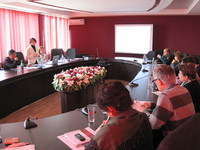 Since 2009, ADRC has initiated a pilot project of DRR Policy Peer Review with the aim of developing DRR capacity of the ADRC member countries by sharing information and strengthening the relationship among member countries.
Since 2009, ADRC has initiated a pilot project of DRR Policy Peer Review with the aim of developing DRR capacity of the ADRC member countries by sharing information and strengthening the relationship among member countries.
This year, Improving the earthquake safety of nursing homes and orphanages in Armenia was selected as one of the target projects of the fifth year. After the submission of country report, reviewer team composed of Ph.D. Aiko Sakurai (Associate Professor, Graduate School of International Cooperation Studies, Kobe University, Japan), Dr. Renato U. Solidum, Jr (Director, Philippine Institute of Volcanology and Seismology, Philippines) and Mr. Junji Moriwaki (Researcher of ADRC) had visited Armenia to conduct interview surveys.
The team visited National Survey for Seismic Protection Agency, involving in DRR activities to examine how they have been making efforts of developing DRR in Armenia. Then, the team conducted inspection of nursing homes and orphanages for checking current situations, and prepared a draft report of the survey result with all findings and recommendations. Also the workshop was held for getting opinion and comments to finalize the report as well as introducing good practices for DRR activities in Japan and Philippines. It provided a very good opportunity for exchanging opinions each other.
This project aims at developing the mutual learning process among the ADRC member countries instead of one-way learning. After the survey missions, reviewer team will compile survey reports and send them to target countries and then to the ADRC member countries to enhance cross-fertilization.
ADRC would like to express its sincerest gratitude to all of those who have made precious contribution to this project.
(2014/2/23 19:40)
Myanmar is a disaster prone country. On May 2008, 130,000 people were perished or missed by Cyclone Nargis, and they had floods and landslides in 2010, a heavy earthquake in 2011.
For this reason, the Myanmar Government stipulated the " Myanmar Action Plan for Disaster Risk Reduction" in 2012, and has been promoting various DRR projects based on the Plan. The Myanmar Government decided the establishment of "Disaster Management Training Center" in order to enhance disaster prevention awareness in people and to train the personnel involved in disaster management, and planned to build their facilities in 3 years from 2013.
In 2nd to 4th of July, with the aim of making proposals and advice to the Myanmar Government for training and educational content in the center, sponsored by International Cooperation Agency of Japan (JICA), the United Nations Development Programme, this workshop was held in Nay Pyi Daw, the new capital city of Myanmar. About 80 people from the governments of Asia including Myanmar, international organizations, and NPOs participated in the workshop, and one of the ADRC staff was invited to this workshop.
In the workshop, there were introductions of the education / training center of Thailand and Singapore, JICA and the Asian Disaster Preparedness Center also introduced their international capacity building businesses. The ADRC presented our capacity building activities for Myanmar, such as the Visiting Researcher program in which we invite young officials of member countries to Japan and the DRR training program for local government officials sponsored by Japan-ASEAN Integration Fund.
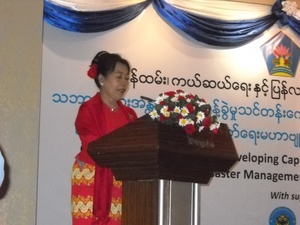
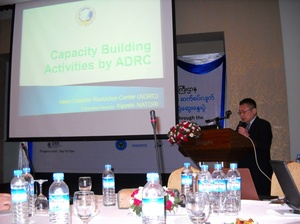
14-21 December 2012, ARMENIA
Since 2009, ADRC has initiated a pilot project of DRR Policy Peer Review with the aim of developing DRR capacity of ADRC member countries by sharing information and strengthening the relationship among member countries.
This year, DRR Education in Armenia was selected as one of the target projects of the fourth year. After the submission of country report, reviewer team composed of Ph.D. Aiko Sakurai (Associate Professor, Graduate School of International Cooperation Studies, Kobe University, Japan), Ph.D. Vishnu Dangol (Professor of Geology, Tribhuvan University, Nepal) and Mr. Junji Moriwaki (Researcher of ADRC) had visited Armenia to conduct interview surveys.
The team visited National Survey for Seismic Protection Agency and other organizations involving in DRR Education activities to examine how they have been making efforts of developing DRR Education in Armenia. Then, the team conducted inspection of classes and evacuation drills at the school of Yerevan and Gyumri, and prepared a draft report of the survey result with all findings and recommendations. Also the workshop was held in two cities for getting opinion and comments to finalize the report as well as introducing good practices for DRR Education activities in Japan and Nepal. It provided a very good opportunity for exchanging opinions each other.
This project aims at developing the mutual learning process among ADRC member countries instead of one-way learning. After the survey missions, reviewer team will compile survey reports and send them to target countries and then to ADRC member countries to enhance cross-fertilization.
ADRC would like to express its sincerest gratitude to all of those who have made precious contribution to this project.
(2012/12/14 19:40)
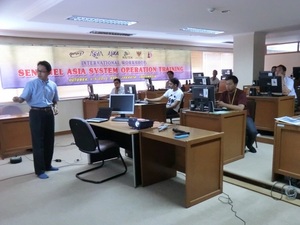
7-9 May 2012 (Tegucigalpa, Honduras)
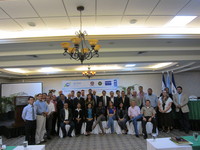
IRP/ADRC contributes to the enhancement of post-disaster recovery operations by supporting governments in recovery planning. In this context, a workshop on resilient recovery planning was organized on 7-9 May 2012 at Maya Hotel in Tegucigalpa, Honduras.
There were over 40 participants from both governments and development organizations, including Minister of Disaster Prevention, El Salvador and Mayor of Santa Tecla, El Salvador. Among the participants, there were six other municipal mayors who actively engaged in the workshop. The organizers were the Honduras Standing Commission of Contingencies (COPECO), the Coordinating Center for the Prevention of Natural Disasters in Central America (CEPREDENAC), the Central America Integration System for Regional Disaster Risk Management (SICA), the UNISDR, the UNDP, the European Commission, and the IRP/ADRC.
After the workshop, the participants expressed gaining more knowledge of integrating pre-disaster recovery planning into the DRR plans, UNDAF, and other planning instruments at either national government or development organization. As way forward, there are initiating discussions to scale up the training on recovery planning to other sectors of the government. The workshop had television coverage and reported in radio and newspapers in Honduras.
(2012/05/29 14:40)
UNDP-India and IRP/ADRC had jointly organized the training on Disaster Recovery Planning, March 28-30, 2012 at UNDP Country Office, New Delhi, India. Twenty eight representatives from different UN and partner organizations in India, who are engaged in long term post disaster recovery, attended the training. Most are from policy and field level that can influence recovery planning. The recently trained officials will act as master trainers who will transfer knowledge to other officials in their respective organizations. The discussions facilitated the sharing of knowledge and experience in recovery planning with the intention to further enhance capacities and enrich the recovery planning process before and after large scale disaster. Additionally, the discussions provided an avenue for participants to analyze different recovery issues and reflect on wide array of options and examples from global experiences. The outputs of the training include sets of recommendations drawn from the group discussions such as market chain analysis for livelihood recovery from possible future disaster in India, which were fine-tuned by the comments from other participants and experts. As way forward, UNDP and other UN organizations in India are exploring to transfer the knowledge on recovery planning to other stakeholders from national agencies down to the village level.
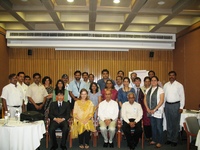
13-14 December 2011 (Brunei)
ADRC has been implementing web-based GLIDE-associated disaster database development project in ASEAN countries since 2008 with the financial support by Japan ASEAN Integration Fund. The objective of this project is to facilitate all ASEAN countries to develop their own national disaster databases with GLIDE numbers incorporated by training government officials in charge of disaster information in ASEAN countries.
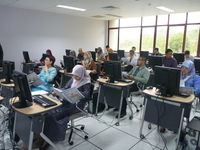
ADRC held operator training for both GLIDE and DesInventar with kind support from National Disaster Management Center (NCDM) and UNISDR at Brunei University.
About 25 government officials from related departments participated in the training and actively exchanged views and opinions for future enhancement of the systems in Brunei.
(2011/12/14 11:30)
28-30 November 2011 (Islamabad, Pakistan)
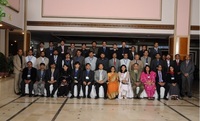
Over thirty nine government officials and representatives from civil society organizations, who are engaged in long-term recovery, participated in the discussions on recovery planning organized by the Government of Pakistan, UNISDR, and UNDP with IRP contributing the key resource persons. The three-day event was held at Hotel Best Western, Islamabad, Pakistan from 28-30 November 2011.
The discussions facilitated the sharing of knowledge and experience on recovery planning with the intention to further enhance capacities and enrich the recovery planning process before and after large scale disaster. Additionally, the discussions were organized to provide an avenue for participants to discuss different recovery issues and reflect on wide array of options and examples from global experiences. Towards the end of the event, recommendations drawn from the group discussions were fine-tuned through comments from other participants and experts from IRP member organizations.
As way forward, NDMA Pakistan, UNDP, and UNISDR are exploring the best way to forward this type of learning event down to the district and village levels. NDMA, in partnership with other development organizations, can serve as focal for dissemination of training on recovery planning at national and local governments as well as other relevant organizations. IRP welcomes opportunity to assist NDMA in this endeavor.
(2012/01/17 14:00)
27-28 October 2011 (Jakarta, Indonesia)
ADRC has been involved in a project to promote the "Multi-disciplinary Hazard Reduction from Earthquakes and Volcanoes in Indonesia" since 2009. As part of the project, many universities and research institutions in Japan and Indonesia have conducted research on disaster mitigation. And the international conference that served as the final meeting of this project was held on 27-29 Oct 2011 in Jakarta, Indonesia. At this meeting, participants reported on all their research and results. ADRC presented a "Guidebook for Teachers" as the outcome document of its exploration of ways to promote disaster education and raise disaster awareness, and to promote partnerships between Indonesian and Japanese government agencies and research institutions.
26 - 27 September 2011 (Yangon, Myanmar)
From 2 to 3 September 2011, Rescue and Resettlement Department (RRD) of the Government of Myanmar and the Asian Disaster Reduction Center (ADRC) jointly conducted a workshop to promote capacity building of local government officials in Myanmar. The workshop was held in Yangon in which more than 30 government officials from different localities participated.
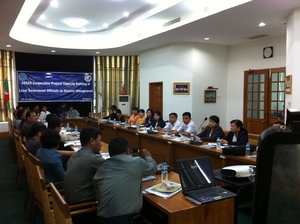
This workshop was conducted as part of the ongoing project which RRD and the ADRC have been implementing since 2010 and has been financed by the Japan ASEAN Integration Fund. Prior to the workshop, training of trainers (TOT) was conducted in March this year. As a result, three out of the ten TOT participants delivered lectures at the workshop this time.
In the workshop, lectures on Total Disaster Management (TDM), Disaster Risk Reduction (DRR) measures and an incident command system in Myanmar, and other issues were delivered by the ADRC, RRD and the TOT trainees. Moreover, following these lectures, a hazard mapping exercise as a field activity and entailing discussion were also conducted.
The local government officials who participated in the workshop showed strong interest in exploring these issues thereby engaging very actively in close discussion and an exchange of opinions. The town watching conducted in areas which were severely affected by the cyclone Nargis in 2008 and activities for awareness raising on DRR for the villagers contributed to assuring the importance of DRR not only among the local officials but also the villagers.
Another two workshops are planned to be held this year, one in Mandalay and the other in Ayeyarwady. It is expected that the project will be useful for the capacity development of local government officials in the country.
As a result of elaboration and discussion, a pilot lesson and seminar will be held at the beginning of March.
Note: This project is part of the Japan-ASEAN Integration Fund Projects and aimed to promote disaster education in ASEAN countries through such means as training of school teachers followed by school lessons facilitated by trained teachers.)
22-25 February 2011, Indonesia
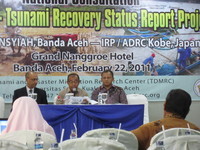 IRP/ ADRC team visited Indonesia to strengthen partnerships in recovery, including consultation and review of Aceh Post-Tsunami Recovery both at Banda, Aceh with TDMRC and Jakarta with BRR Institute.
IRP/ ADRC team visited Indonesia to strengthen partnerships in recovery, including consultation and review of Aceh Post-Tsunami Recovery both at Banda, Aceh with TDMRC and Jakarta with BRR Institute.
The recovery status report on Aceh Tsunami focuses on the learning's along sectors of livelihoods, shelter, infrastructure, and governance. Challenges and lessons were highlighted to inform other governments and relevant stakeholders of unique experience and initiatives. The IRP/ADRC team provided comments, and took advantage of the presence of key actors on Aceh Recovery by providing brief orientation on Disaster Recovery Planning as well as presentation of IRP/ADRC knowledge products and services.
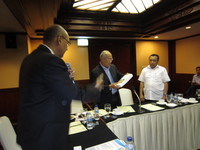 In Jakarta, IRP/ADRC team participated in the BRR Institute Workshop "Governance of Recovery: Lessons from Housing, Settlement and Infrastructure". IRP/ADRC introduced the platform and the lessons from recovery focusing on identified themes. The event attracted high level participation, including vice ministerial levels and heads of development organizations in Indonesia totaling to about 40 delegates. Some were from central government bodies, local governments, universities and research centers. IRP/ADRC publications were circulated and some displayed at the workshop. IRP /ADRC symbolically provided one set of guidance notes on recovery to BRR Institute to promote partnership. Some copies of guidance notes were also given to ministries and representatives of local governments. Among the key outcomes that relate to IRP/ADRC were: (i) potential transfer of IRP training module to BRR Institute, including training of trainers; (ii) closer partnership in the knowledge management function of recovery; and (iii) membership of Government of Indonesia in the IRP Steering Committee.
In Jakarta, IRP/ADRC team participated in the BRR Institute Workshop "Governance of Recovery: Lessons from Housing, Settlement and Infrastructure". IRP/ADRC introduced the platform and the lessons from recovery focusing on identified themes. The event attracted high level participation, including vice ministerial levels and heads of development organizations in Indonesia totaling to about 40 delegates. Some were from central government bodies, local governments, universities and research centers. IRP/ADRC publications were circulated and some displayed at the workshop. IRP /ADRC symbolically provided one set of guidance notes on recovery to BRR Institute to promote partnership. Some copies of guidance notes were also given to ministries and representatives of local governments. Among the key outcomes that relate to IRP/ADRC were: (i) potential transfer of IRP training module to BRR Institute, including training of trainers; (ii) closer partnership in the knowledge management function of recovery; and (iii) membership of Government of Indonesia in the IRP Steering Committee.
The IRP/ADRC team also visited AHA Centre facility, President's Delivery Unit Office for Development Monitoring and Oversight, BNPB, and Australia-Indonesia Facility for Disaster Reduction (AIFDR) to strengthen partnerships in recovery.
(2011/03/22 14:00)
Through many of natural disasters experiences, Japan has accumulated knowledge of dealing with disasters and developed its expertise together with advanced policies and technologies in the area of disaster risk reduction. This unique experience provides Japan with many valuable knowledge and expertise that it must now endeavor to share effectively with other members of the international community. From this point of view, this project is launched by the Cabinet Office of Japanese Government last year. Mongolia and Indonesia were selected as target countries of the FY2010 project.
<Mongolia>
Following the preliminary discussion for project implementation in Mongolia in December 2010 and the study tour in Japan for the official of the National Emergency Management Agency (NEMA): the implementing agency in January 2011, the workshops enhancing disaster risk reduction (DRR) capacities through transferring the measures and tools of Japan were conducted.
On 13-19 February 2011, the NEMA Mongolia in collaboration with the government of Japan and the ADRC conducted a series of workshops and trainings for strengthening the capacities for earthquake disaster education. They include trainings for the NEMA officials and school teachers, a workshop to learn Japanese DRR exercises utilized creative and innovative ideas, and lecture for school students, and DRR exercises in two target schools.

Through the above mentioned activities, the NEMA and the related organizations and schools learned various knowledge, techniques, and tools for enhancing and promoting earthquake disaster education in Mongolia. We believe this project became one of the major driving forces for further promotion of earthquake DRR in Mongolia.
8-9 February 2011, Pakistan and Sri Lanka
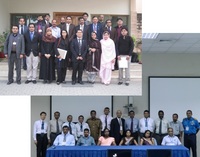
ADRC, TDLC, DMC Sri Lanka, NDMA Pakistan, and IRP jointly organized the training on disaster recovery planning for two SAARC member states. Over 40 high level government officials, who are engaged in long term post disaster recovery, participated in the event. It created a critical mass of government officials sensitized in concepts, principles, and tools of post disaster resilient recovery both at policy and field levels.
The training was linked to other countries through video conferencing. It included lecture, discussion, reflection, simulation through scenario, and presentation of group recommendations at the plenary. Participants were encouraged to share their experiences and lessons with other countries for improved understanding and abilities in recovery. Comments for improving recovery plans were facilitated by IRP trainers with comments from ADRC Executive Director and other experts at different VC sites.
Majority of the participants were decision-makers (Directors and Generals) indicating that the training attracted the interest of governments. It was clearly expressed that demand for training is at provincial and district levels. The use of case studies for training was highly appreciated by most participants, as it presented actual experiences. Suggestions to include more case studies from both Pakistan and Sri Lanka were strongly made.
Additionally, adjustments in the training module will be made, such reducing the length of lectures and adding more photos to the presentations to better describe the key recovery messages. Encouraging governments to own the training activities will be further promoted by transferring the training module. This arrangement will be strengthened in future training activities to reach out local government officials. (2011/02/09 14:20)
5-10 December 2010 (Ulaanbaatar, Mongolia)
12-16 December 2010 (Dhaka and Noakhali, Bangladesh)
Since 2009, ADRC has initiated a pilot project of ADRC Peer Review with the aim of developing DRR capacity of ADRC member countries by sharing information and strengthening the relationship among member countries. This year Mongolia and Bangladesh were selected as target countries among applications from ADRC member countries. After the submission of country reports by the two target countries, reviewer teams, which consist of two officers from member countries, one expert from Japan and one or two from ADRC per a target country, have visited target countries to conduct interview surveys.
<Mongolia>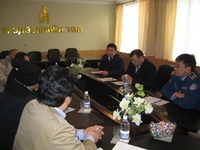 On 5-10 December 2010, the ADRC reviewer team, composed of Prof. Masato Motosaka (Earthquake Disaster Research Laboratory, Disaster Control Research Center, Graduate School of Engineering, Tohoku University), Mr. Tshering Kezang (Governor, Dzongkhag Administration, Lhuentse, Bhutan), Mr. Vizesh Rana (Deputy Commandant, Ministry of Home Affairs, India) and two ADRC staff members visited Ulaanbaatar, Mongolia. During the four day survey, the team visited various ministries and institutions related to DRR activities, including NEMA: National Emergency Management Agency (ADRC's counterpart in Mongolia), to examine how they have been making the efforts for earthquake disaster education and capacity development by government and non-governmental organizations in Mongolia. Then, the team conducted on-site review of the building condition, and prepared a draft report of the survey result with all findings and recommendations. On the last day of the survey, a workshop was held for getting opinion and comments to finalize the report and attended by about 30 NEMA officials. The representative from Bhutan and India also made presentations on their efforts for earthquake disaster reduction in the workshop. It provided a very good opportunity for exchanging opinions each other.
On 5-10 December 2010, the ADRC reviewer team, composed of Prof. Masato Motosaka (Earthquake Disaster Research Laboratory, Disaster Control Research Center, Graduate School of Engineering, Tohoku University), Mr. Tshering Kezang (Governor, Dzongkhag Administration, Lhuentse, Bhutan), Mr. Vizesh Rana (Deputy Commandant, Ministry of Home Affairs, India) and two ADRC staff members visited Ulaanbaatar, Mongolia. During the four day survey, the team visited various ministries and institutions related to DRR activities, including NEMA: National Emergency Management Agency (ADRC's counterpart in Mongolia), to examine how they have been making the efforts for earthquake disaster education and capacity development by government and non-governmental organizations in Mongolia. Then, the team conducted on-site review of the building condition, and prepared a draft report of the survey result with all findings and recommendations. On the last day of the survey, a workshop was held for getting opinion and comments to finalize the report and attended by about 30 NEMA officials. The representative from Bhutan and India also made presentations on their efforts for earthquake disaster reduction in the workshop. It provided a very good opportunity for exchanging opinions each other.
<Bangladesh>
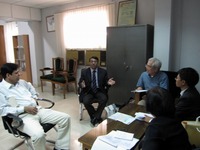 Another reviewer team composed of Dr. Taiichi Hayashi of Research Center for Fluvial and Coastal Disasters of Disaster Prevention Research Institute of Kyoto University, Mr. San Kung from Myanmar's Relief and Resettlement Department, Ministry of Social Welfare, Relief and Resettlement, Ms. Crispina B. Abat of Philippines' Office of Civil Defense, and Ms. Yumi Shiomi of ADRC visited Bangladesh on 12-16 December 2010 to conduct a survey for learning about their ongoing efforts for Cyclone Preparedness in the country. The survey began with visiting relevant organizations in Dhaka such as Disaster Management and Relief Division of Ministry of Food and Disaster Management (ADRC's counterpart in Bangladesh), its Disaster Management Bureau, Bangladesh Meteorological Department, Bangladesh Water Development Board, Institute of Water Modeling and Bangladesh Red Crescent Society. Then the team moved to cyclone-prone Noakhali District in the coastal region to learn the situations through interviewing local DRM officials, volunteers and residents, and visiting cyclone shelters and embankments. The team members with cyclone expertise and experiences of severe storm countermeasures in their countries actively shared opinions during the survey.
Another reviewer team composed of Dr. Taiichi Hayashi of Research Center for Fluvial and Coastal Disasters of Disaster Prevention Research Institute of Kyoto University, Mr. San Kung from Myanmar's Relief and Resettlement Department, Ministry of Social Welfare, Relief and Resettlement, Ms. Crispina B. Abat of Philippines' Office of Civil Defense, and Ms. Yumi Shiomi of ADRC visited Bangladesh on 12-16 December 2010 to conduct a survey for learning about their ongoing efforts for Cyclone Preparedness in the country. The survey began with visiting relevant organizations in Dhaka such as Disaster Management and Relief Division of Ministry of Food and Disaster Management (ADRC's counterpart in Bangladesh), its Disaster Management Bureau, Bangladesh Meteorological Department, Bangladesh Water Development Board, Institute of Water Modeling and Bangladesh Red Crescent Society. Then the team moved to cyclone-prone Noakhali District in the coastal region to learn the situations through interviewing local DRM officials, volunteers and residents, and visiting cyclone shelters and embankments. The team members with cyclone expertise and experiences of severe storm countermeasures in their countries actively shared opinions during the survey.
This project aims at developing the mutual learning process among the ADRC member countries instead of one-way learning. After the survey missions, reviewer teams will compile survey reports and send them to target countries and then to ADRC member countries to enhance cross-fertilization.
ADRC would like to express its sincerest gratitude to all of those who have made precious contribution to this project this year.
(2010/12/21 17:40)
Note: This project is part of the Japan-ASEAN Integration Fund Projects and aimed to promote disaster education in ASEAN countries through such means as training of school teachers followed by school lessons facilitated by trained teachers.)
ADRC held the First Coordination Meeting for Japan-ASEAN Integration Fund Project "Promotion of Disaster Education of Schools" in collaboration with the Ministry of Education of Lao People's Democratic Republic. In the meeting, the project outline was introduced by ADRC. Then, Ministry of Education reported the latest situation of disaster education in Laos. Some materials and teacher's manual have been already developed in Laos, and it is agreed to effectively use these existing materials for our activity.
Hereafter, the teaching materials will be drafted for the Training of Pilot Teachers.
14-23 July 2010, Vientiane, Lao PDR
Asian Disaster Reduction Center (ADRC) conducted the program "Capacity Building of Utilization of Satellite Image for Disaster Management" in Vientiane, Lao PDR from 14 to23 July 2010. This program consisted of one-day seminar and five- days training both to promote the utilization of space based technology, and it was conducted in collaboration with Asian Institute of Technology (AIT), and the Remote Sensing Center of Water Resources & Environment Institute, Water Resources and Environment Administration under Prime Minister Office (RSC/WREI/WREA), Government of Lao PDR.
This is one of the four capacity development programs in ASEAN countries that ADRC has been implementing since 2008, with other three including disaster education promotion, development of Web-based GLIDE-associated disaster database and capacity building of local government officials.
Satellite Images were utilized to estimate flood damages and to implement emergency activities when Vientiane was heavily inundated in August 2008. Through this experience, a shortage of engineers capable of applying space based technology to disaster management was recognized so that capacity building of engineers in relevant fields has become an urgent need.
ADRC will continue to cooperate with RSC/WREI/WREA and other relevant agencies to further promote the utilization of satellite data in the field of disaster management in Lao PDR. ADRC also plans to conduct this program in other ASEAN countries.
For more details of this project, please visit the following web site.
http://www.geoinfo.ait.ac.th/adrc/index.htm
(2010/08/02 13:20)
26 March 2010 (Yogyakarta, Indonesia)
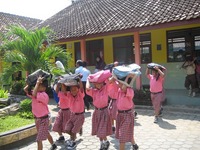
The pilot lesson and seminar for "Promotion of Disaster Education of Schools" project was held in Yogyakarta, Indonesia, from 26th to 27th March. It was organized jointly by the Ministry of National Education of Indonesia and the Asian Disaster Reduction Center (ADRC). More than fifty teachers of primary school and lots of students attended this two-day workshop.
On 26th March, teachers had a lecture "Basic Knowledge about Natural Disaster" for student based on the subjects lectured in the Training of Trainers (TOT) in March 2010. And they also conducted "Evacuation Drill against Earthquake" for students of each class on the same day. And the next day, participants including teachers, experts and the ADRC summarized the whole program of this project during the seminar. It was suggested that continuous activity by themselves and support by national/local government will be necessary for the spread of disaster education.
ADRC hopes that the outcome of this project will be shared in other schools on disaster education throughout the Indonesia.
Note: This project is part of the Japan-ASEAN Integration Fund Projects and aimed to promote disaster education in ASEAN countries through such means as training of school teachers followed by school lessons facilitated by trained teachers.)
(2010/04/19 18:30)
1 March 2010 (Yogyakarta, Indonesia)
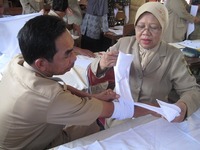
The Training of Pilot Teachers for "Promotion of Disaster Education of Schools" project was held in Yogyakarta, Indonesia, from 1st to 2nd March 2010. It was organized jointly by the Ministry of National Education of Indonesia and the Asian Disaster Reduction Center (ADRC). More than fifty teachers of primary school, including experts as lecturer, attended this two-day workshop.
Participants took lectures about "Latest Situation of Disaster Education in Japan", "Earthquake Disaster Risk Reduction in Japan", "Basic Knowledge about Natural Disaster", etc. In the past, there were lots of earthquakes in this province including the latest one in 2006, claimed more than 6,000 lives. Therefore, participants joined in this workshop with a passionate concern. In particular, "First aid training" was effective tool for them to support their students.
As a result of elaboration and discussion, a pilot lesson and seminar will be held on 26th and 27th March this year.
Note: This project is part of the Japan-ASEAN Integration Fund Projects and aimed to promote disaster education in ASEAN countries through such means as training of school teachers followed by school lessons facilitated by trained teachers.)
(2010/4/19 18:30)
29 January 2010 (Indonesia)
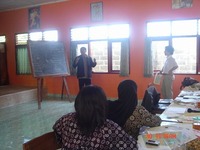
"Promotion of Disaster Education in Schools" Project in Indonesia
ADRC collaborated with Indonesia' Ministry of National Education to organize the second coordination meeting for "Promotion of Disaster Education of Schools" project in Indonesia. First, ADRC and a task-team on the Indonesia side discussed situation report on disaster education in Indonesia and provisional education materials on 28th. It was followed by a meeting with provincial education bureau's officials and a principal and teachers of a pilot school in Yogyakarta on 29th. As a result of elaboration and discussion, ADRC and Task-Team decided that a training program for school teachers be held on 1st- 2nd March this year.
Note: This project is part of the Japan-ASEAN Integration Fund Projects and aimed to promote disaster education in ASEAN countries through such means as training of school teachers followed by school lessons facilitated by trained teachers.)
(2010/02/22 18:30)
13-14 December (Dhaka, Bangladesh)
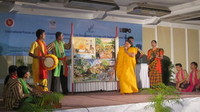 ADRC actively participated in the International Forum on Tornado Disaster Risk Reduction held on 13-14 December 2009 in Dhaka, Bangladesh. This event was organized jointly by the Ministry of Food and Disaster Management and the Ministry of Defense of Bangladesh, Tokyo Polytechnic University, the Bangladesh Disaster Preparedness Center (BDPC), and the International Association of Wind Engineering.
ADRC actively participated in the International Forum on Tornado Disaster Risk Reduction held on 13-14 December 2009 in Dhaka, Bangladesh. This event was organized jointly by the Ministry of Food and Disaster Management and the Ministry of Defense of Bangladesh, Tokyo Polytechnic University, the Bangladesh Disaster Preparedness Center (BDPC), and the International Association of Wind Engineering.
Bangladesh is known as a country prone to various natural hazards, including cyclones, floods, and storm surges. Tornados occur almost every year, often resulting in extensive casualties and damage. Recently, for example, the 1996 tornado in Tangail killed about 700 people. Despite such devastating consequences, adequate tornado preparedness measures are still lacking, with efforts still needed in the areas of early warning systems and evacuation shelters. This forum was therefore held to raise awareness among policymakers, practitioners, and civil society of the risks posed by tornadoes and other severe local storms, as well as to promote the development of strategies for mitigating future disaster risks.
During the forum, ADRC gave two presentations, on "Governance and Policy Making" and "Public Awareness and Education." ADRC presented a wide range of issues concerning the progress made toward the HFA, as well as the remaining challenges, and highlighted the roles that awareness-raising efforts and education should play in Bangladesh. The presentations also summarized the ADRC's relevant activities in Bangladesh in the past. For more details, please visit the website(http://www.iawe.org/WRDRR_Bangladesh/).
(2009/12/14 13:10)
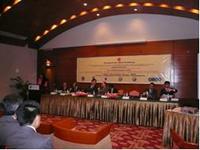 The 4th ERRP Regional Workshop was held in Dhaka on 10-12 Decmber 2009. The participants from each ERRP country exchanged of their opinions actively in the general workshop and also group formation/ discussions in parallel sessions concerning about the technical / financing/ monitoring and evaluation. On the last day of the Workshop, we visited Mirpur Training Center, Fire Service and Civil Defense and observed the fire drill at earthquake time. Flood disaster prevention is the major disaster management in Bangladesh, but felt enthusiasm to wrestle with earthquake disaster prevention more positively. At the end, it is requested from ADRC to make the best use of the results of last 2 years' ERRP activities in each member country and to develop ERRP further at each country level continuously in future.
The 4th ERRP Regional Workshop was held in Dhaka on 10-12 Decmber 2009. The participants from each ERRP country exchanged of their opinions actively in the general workshop and also group formation/ discussions in parallel sessions concerning about the technical / financing/ monitoring and evaluation. On the last day of the Workshop, we visited Mirpur Training Center, Fire Service and Civil Defense and observed the fire drill at earthquake time. Flood disaster prevention is the major disaster management in Bangladesh, but felt enthusiasm to wrestle with earthquake disaster prevention more positively. At the end, it is requested from ADRC to make the best use of the results of last 2 years' ERRP activities in each member country and to develop ERRP further at each country level continuously in future.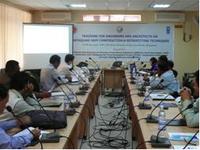 In addition, ADRC carried out the guidance of the technical assistance service on 7-8 December 2009 at Rangamati Municipality ( from Chittagong to north-east for about three hours by car). We conducted the training about "Earthquake safe construction of Masonry Building" and "Quality Management of Reinforced Concrete Building" to the thirty local engineers stationed in Rangamati Municipality, then we visited several construction sites to observe the defects and also the counter measures with exchanging the technical opinions between us. This technical assistance service had been successfully completed.
In addition, ADRC carried out the guidance of the technical assistance service on 7-8 December 2009 at Rangamati Municipality ( from Chittagong to north-east for about three hours by car). We conducted the training about "Earthquake safe construction of Masonry Building" and "Quality Management of Reinforced Concrete Building" to the thirty local engineers stationed in Rangamati Municipality, then we visited several construction sites to observe the defects and also the counter measures with exchanging the technical opinions between us. This technical assistance service had been successfully completed.17-18 November 2009 (Bangkok, Thailand)
25-26 November 2009 (Paro, Bhutan)
ADRC has initiated a pilot project of DRR Policy Peer Review this year. This new project is aimed at developing DRR capacity of ADRC member countri es by sharing information and strengthening the relationship among member countries. The topic for this year has been selected as "disaster education and public awareness" and Bhutan and Thailand for countries to be reviewed.
After the submission of country reports by two target countries, reviewer teams, which consist of one officer from a member country, one expert from Japan and one from ADRC per a target country, have visited target countries to conduct surveys.
Thailand
On 17-18 November 2009, the ADRC reviewer team, composed of Mr. Naoki Shiratsuchi of Japanese Red Cross, Dr. Alvaro Antonyan of Armenian National Survey for Seismic Protection Agency and Ms. Maki Yoshida of the ADRC, visited Thailand
During the two day survey, the team visited various ministries and institutions, including Department of Disaster Prevention and Mitigation (ADRC's counterpart in Thailand), Ministry of Education, National Disaster Warning Center and Thai Red Cross Society to examine how they have been making the efforts for disaster education and public awareness by government and non-governmental organisations in Thailand.
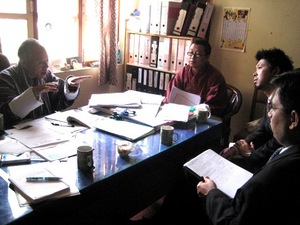 Bhutan
BhutanAnother reviewer team composed of Dr. Koichi Shiwaku of Earthquake Disaster Mitigation Research Center of the National Research Institute for Earth Science and Disaster Prevention (EDM-NIED), Mr. Arshad Nawaz Chheena from Pakistan's National Disaster Management Authority and Ms. Maki Yoshida of ADRC visited Bhutan on 25-26 November 2009 and conducted the survey by learning about their ongoing efforts for disaster education and public awareness by visiting Department of Disaster Management (ADRC's counterpart in Bhutan), Department of School Education, Department of Geology and Mines, Standard Quality and Control Authority and UNDP office.
This project aims at developing the mutual learning process among the ADRC member countries in stead of one-way learning. After the survey missions, reviewer teams will compile survey reports and send them to target countries and then to ADRC member countries to enhance cross-fertilisation. In addition, ADRC will further elaborate on the programme based on the results of this year's project for possible improvement in the ways this project is conduced for coming years.
ADRC would like to express its sincerest gratitude to all of those who have made precious contribution to this project this year.
(2009/11/16 16:50)
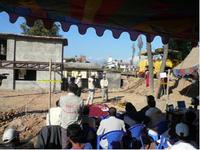 ADRC conducted the second pull down test of a retrofitted building in Kathmandu, Nepal, on 2-3 November to compare with the first pull down test of a non-retrofitted building on 15 October as one of activities of Earthquake Risk Reduction and Recovery Preparedness Programme (ERRP).
ADRC conducted the second pull down test of a retrofitted building in Kathmandu, Nepal, on 2-3 November to compare with the first pull down test of a non-retrofitted building on 15 October as one of activities of Earthquake Risk Reduction and Recovery Preparedness Programme (ERRP).The non-retrofitted building used for the first pull down test completely fell down by intensity 13.5 ton, whereas the retrofitted building used for the second test did not even crack when intensity reached as much as 25 ton.
The comparison clearly demonstrates that earthquake-resistance of a building can be strengthened by applying the proposed retrofitting method (steel wire mesh plus mortal coating).
We will further examine the test results and produce a poster to promote the use of the proposed retrofitting method to masonry buildings as a very useful and cost-effective tool to enhance earthquake resistance.
The Asian Disaster Reduction Center has been carefully planned and prepared "Pull Down Test" for the last one year as a big event of "Earthquake Risk Reduction and Recovery Preparedness Program for the South Asian Region". The first "Pull Down Test" of the existing non-retrofitted building was conducted on 15 October in Katmandu, Nepal.
This time, a 30-years old existing building was pulled until falling. The main purposes of the experiment are to enhance awareness of the threat of earthquake by observing actual situation how the building is collapsed when a big earthquake occurs, and also to examine the strength of an old house. Further, we will conduct the second "Pull Down Test" on 2 November for the purpose of verifying the effectiveness of the retrofitting by the JAKETTING method.
Many participants from Nepal government, United Nations, the ERRP member countries, and local communities observed the result of the experiment with particular interst. As the tensility was carefully enlarged, the cracks on the wall of the house became bigger, and finally the house was collapsed in a moment. The participants could realize well the vulnerability of the existing buildings to the big earthquakes. Further, local newspapers covered the event giving a great deal of space, which contributed to raiging people's awareness of disasters.

17-19 August 2009 (Kuala Lumpur, Malaysia)
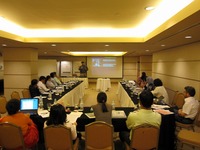 ADRC, with support from the Japan International Cooperation Agency (JICA), conducted the third year of the "NGO Training for Disaster Risk Reduction in Asia" Project from 17 to 19 August 2009 in Kuala Lumpur, Malaysia. This year, as the final year of this project, the programme aims at developing a disaster risk reduction tool booklet as an outcome of this capacity development project. Six first-year participants, ADRRN secretariat and ADRC gathered in Kuala Lumpur to further discuss on the booklet, as well as to hold a workshop on disaster risk reduction tools and methodologies.
ADRC, with support from the Japan International Cooperation Agency (JICA), conducted the third year of the "NGO Training for Disaster Risk Reduction in Asia" Project from 17 to 19 August 2009 in Kuala Lumpur, Malaysia. This year, as the final year of this project, the programme aims at developing a disaster risk reduction tool booklet as an outcome of this capacity development project. Six first-year participants, ADRRN secretariat and ADRC gathered in Kuala Lumpur to further discuss on the booklet, as well as to hold a workshop on disaster risk reduction tools and methodologies.
The workshop held on 18 August was attended by 20 people in total including a Malaysian government official, NGO officers based in Malaysia, Thailand and Japan, and a JICA officer. In the workshop, six first-year participants introduced and shared tools and methodologies which they learnt mostly through this project, focusing on how they applied them in their disaster risk reduction activities.
The workshop participants provided the first-year participants various questions and inputs such as tools' impacts to communities, application of community based disaster risk management tools in Malaysia, integration of local government officials into community projects and management of disaster memorial centers.
The first-year participants and ADRC will elaborate the tool booklet reflecting the inputs gained from the workshop and publish it by the end of this year.
(2009/08/27 17:40)
The International Recovery Platform (IRP), UNDP-India, ADRC, NDMA-India, and SDMC jointly organized the Regional Conference on Earthquake Risk Reduction held at India International Centre, New Delhi, India on July 29-31, 2009. Over 200 participants, including representatives from Earthquake Risk Reduction and Recovery Preparedness Programme (ERRP) country teams, technical experts, practitioners, and relevant stakeholders, gathered during the three-day to discuss experiences, share knowledge, and facilitate technical cooperation.
[more]
23 June 2009 (Thailand)
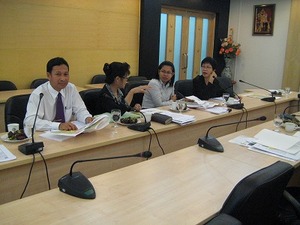 On 23rd June 2009, ADRC held the Coordination Meeting for Japan-ASEAN Integration Fund Project "Promotion of Disaster Education of Schools" in collaboration with Office of the Permanent Secretary and Basic Education Commission, the Ministry of Education of Thailand. In the meeting, the project outline was introduced and the latest situation of disaster education in Thailand was reported. A lot of materials have already been developed; therefore, it is effective to make use of them for our activity. Hereafter, the teaching materials will be drafted for the Training of Pilot Teachers.
On 23rd June 2009, ADRC held the Coordination Meeting for Japan-ASEAN Integration Fund Project "Promotion of Disaster Education of Schools" in collaboration with Office of the Permanent Secretary and Basic Education Commission, the Ministry of Education of Thailand. In the meeting, the project outline was introduced and the latest situation of disaster education in Thailand was reported. A lot of materials have already been developed; therefore, it is effective to make use of them for our activity. Hereafter, the teaching materials will be drafted for the Training of Pilot Teachers.
(2009/06/16 18:30)
14 May 2009 (Indonesia)
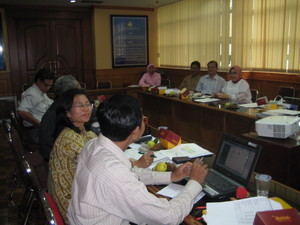
On 14th May 2009, ADRC held the Coordination Meeting for Japan-ASEAN Integration Fund Project "Promotion of Disaster Education of Schools" with the Ministry of National Education of Indonesia. In the meeting, the project outline was explained and latest situation of disaster education in Indonesia was reported. Hereafter, the teaching materials will be drafted for the Training of Pilot Teachers.
24-25 November 2008 (Armenia)
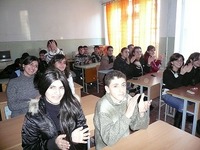
On 24 and 25 November 2008, the Armenian National Survey for Seismic Protection (NSSP) and the ADRC held a seminar entitled "Knowledge: Achieving Safer Communities through Education and Training in Disaster-Prone Mountainous Areas" in Syunik Prefecture and Vayot' Dzor Prefecture. Mr. Takaaki Shiratori of the Takenaka Corporation, a leading private construction company in Japan, was invited to give a seminar focusing on measures for coping with the damage caused by the collapse of school buildings, reservoirs and dams. The participants were highly interested in both lectures, as Armenia and Japan share similar geographical features, including mountainous terrain, and both were followed by active questionand-answer sessions.
(2008/11/28 18:30)



